#Valéry Giscard d'Estaing
Text
Napoleonic era fiction
Having shared with you the history books about the Napoleonic era I've read recently, let me talk a little bit on the topic of historical fiction. (Not that I read this kind of book much, but there are some I'd like to express my opinion of.)

The first one in my list will be La Victoire de la Grande Armée, by the former French President Valéry Giscard d'Estaing. It's an alternative history book, where it is imagined what might have happened if in 1812 the Grand Armée had left Russia just after the battle of Moscow. (A spoiler - as one can guess from the title, everything should have went well for the Napoleonic France).
Alas, there are a lot of discrepancies in the book (like, for example, Poniatowski and Grouchy are marshals already in 1812); in additional, the protagonist (a general named François Beille) seems to be a kind of Marty Stu. Nevertheless, I liked this book, because... in that reality prince Józef didn't die in the battle of Leipzig (because the battle just didn't take place)! On the contrary, he's being made the king of the the restore Poland (though, I must admit, Poniatowski in fact didn't long for a crown - more on the topic here).
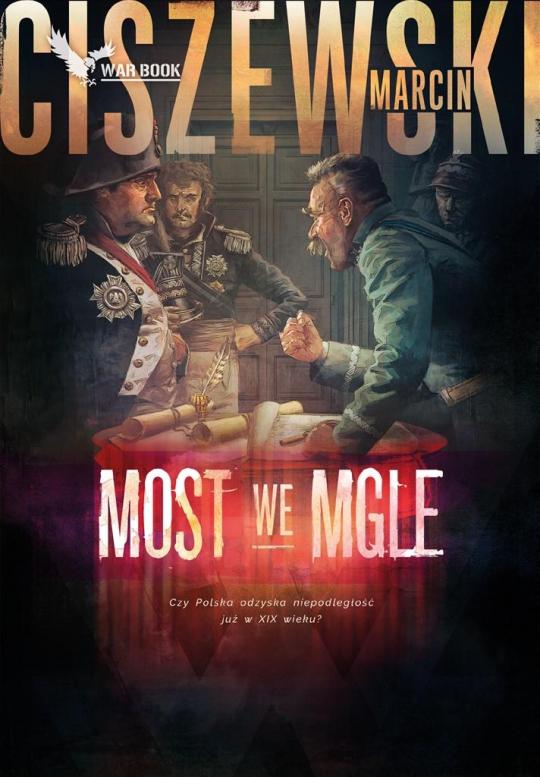
2. Having touched the topic of alternative history I can't help omitting another book (which, unfortunately, hasn't AFAIK been translated to any foreign language that's why I can now recommend it to my Polish speaking friends only). The book's title is Most we mgle (A Bridge In A Fog) and it is written by Marcin Ciszewski.
The plot is that in 1930ies Poland there appeared a time hole leading to 1813, using which a squad of the Polish soldiers was able to go back in time and change the result of the battle of Leipzig. So, in that universe prince Józef didn't die either )) (Though even there he had to become a king ;))
3. From alternative history of Poland let's switch to the real one, and here I have to digress a little to introduce you the next set of book. A friend of mine had once recommended me The Polish trilogy, a series of book by an American writer James Conroyd Martin, mentioning that in one of the books prince Józef's death in the battle of Leipzig is described. (A spoiler - there was such a scene in the second book, but it was not the most detailed description of the event I've stumbled upon, given all the books on the topic I've read, though it may be the only of those written in English.)
Having started to read the first book, I soon discovered that it wasn't an entire fiction, but was based on a real diary of a woman, Anna Maria Berezowska-Stelnicka, who lived in Poland in the end of the XVIIIth century. The diary was inherited by her descendants who live now in the US, and it was also translated to English and published and this is a book I do recommend to read:
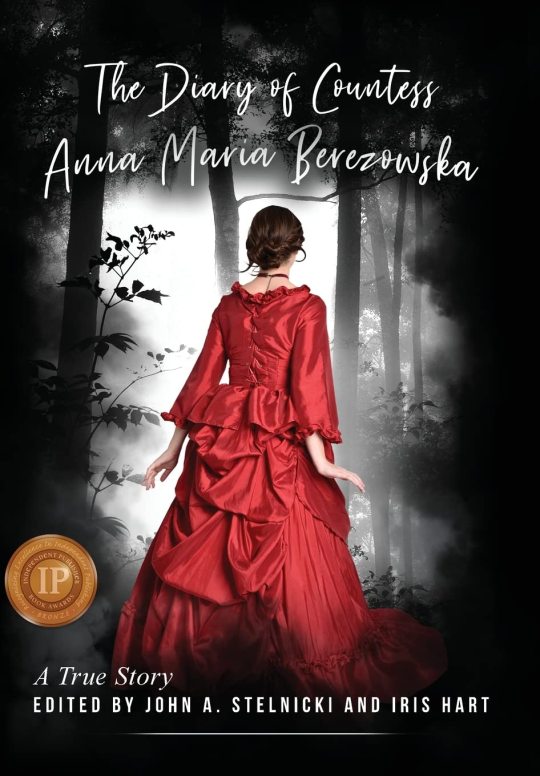
4. And what about the book series? Alas, here I can't be so enthusiastic.
First, it contained a lot of typos (in Polish names etc.; it might have been fixed in the Polish edition, but I was able to find the English one so I read it) and even some historical (for instance, women working as civil-cervants' secretaries of Russian administration in Warsaw in 1830-ies) and geographical discrepancies (for example, according to the author to the East of Warsaw there are stepps which go all the way to Moscow).
In addition, I didn't like how Martin adjusted the real characters from the diary on which he based the first book of his. Also, it surprised me that John Stelnicki, Anna's descendant who is the current owner of her diary, chose a male writer to process the diary into a fiction story (in my opinion, in the book there were scenes where the female protagonist would act illogical and unfeminine and those were the scenes not present in the original diary).

And the second and the third books aren't at all based on the diary events - the action of both diary and the first book, Push not the River, ends in 1794. The second one, Against a Crimson Sky, is set in the span from 1794 to 1814, the last one, The Warsaw Conspiracy, is dedicated the Polish November Uprising which started in 1830 and lasted till October of the next year.
The second book I liked more (and it was there where prince Józef's death was described), but unfortunately, the discrepancies between the characters behavior and how real people of that time did think and act (if to compare with the real diaries and memoires of other real people) only enhanced. (Though it was kind of fun to recognize whose memoires the author was using to describe this or those event).
The last book... well, the November Uprising isn't really my cup of tea, so there were less things there that did catch my eye (but nevertheless, as I've mentioned above, they were). And I was really disappointed that in the epilogue of the book there was nothing about how Anna's family got to America. For because of the Uprising they had to leave Poland everything pointed out that they or there descendants wouldn't have return to the motherland until Poland gained independence in 1918... That's why, taking into account that Anna's descendant who is the owner of her diary does live in the US, it seemed to me it was worth to mention that the family moved to the New World (even if the real chain of events due to which the diary ended in the US couldn't be restored).
5. And the last image is to illustrate more of a question than a recommendation. For the sake of inspiration I decided to look for historical romances where the story is set in Napoleonic France. But, to my great disappointment, it turned out that there are not very much of them. The French Wikipedia in fact mentioned the only one series of books - Juliette Benzoni's Marianne, the set which I read, and even more than once. But those books, in my opinion, though may arouse interest in a person of fourteen, but can't IMHO inspire people in their forties (at least due to the fact that the main love interest of the heroine is a cynical abuser).
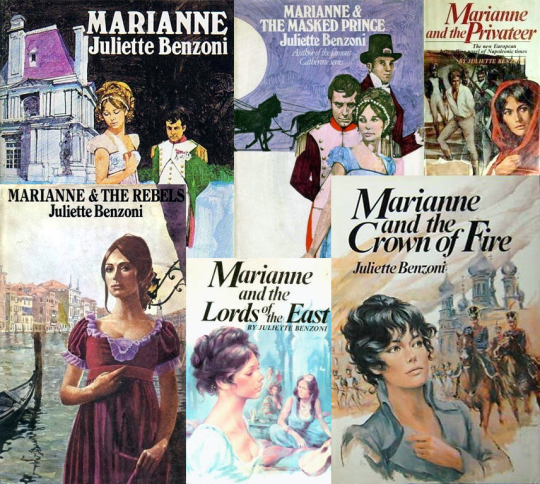
That's why I would like to ask you, my friends, for a recommendation of historical romance with the action set in Napoleonic France or its satellites (and where the protagonists are, of course, on the French side ;))
#Valéry Giscard d'Estaing#1812#napoleon#La Victoire de la Grande Armée#Józef Poniatowski#napoleonic era#napoleonic era fiction#Most we mgle#Marcin Ciszewski#alternative history#Anna Maria Berezowska-Stelnicka#James Conroyd Martin#The Polish trilogy#historical romance
10 notes
·
View notes
Text
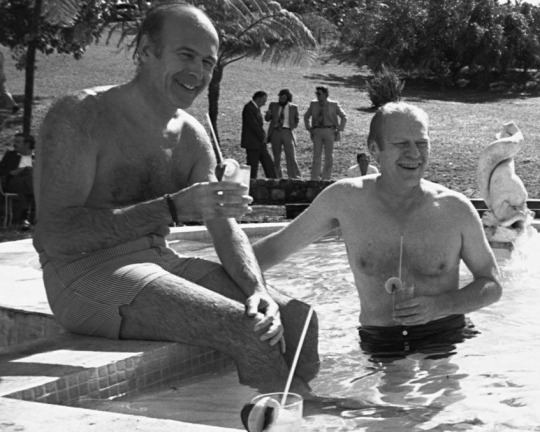

Valéry Giscard d'Estaing & Gerald Ford
in 1974
#daddy#daddylove#hot daddy#daddywiki#handsome daddy#sexy daddy#daddies#americans#daddyoftheday#my favorite#mature daddy#handsome#hairy daddy#daddy issues#swimsuits#pool daddies#Valéry Giscard d'Estaing#Gerald Ford#French men#French man#French daddies#frenchman#French president#u.s. president#potus
64 notes
·
View notes
Text

Valéry Giscard d'Estaing
#suitdaddy#suiteddaddy#suit and tie#suited daddy#men in suits#silverfox#suitfetish#waistcoat#three piece suit#suited men#suited grandpa#suitedman#suit daddy#suited man#buisness suit#suits#french man#french men#Valéry Giscard d'Estaing#Valery Giscard d'Estaing
22 notes
·
View notes
Text
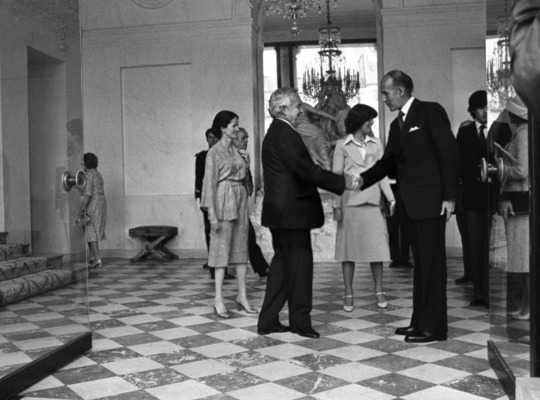
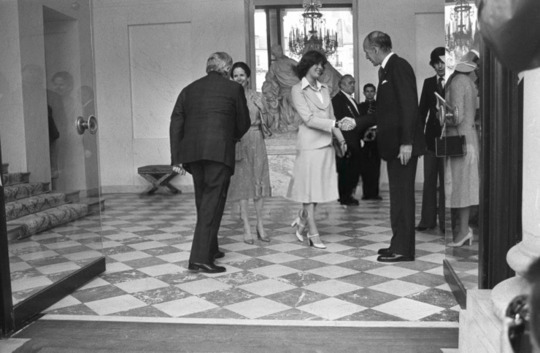
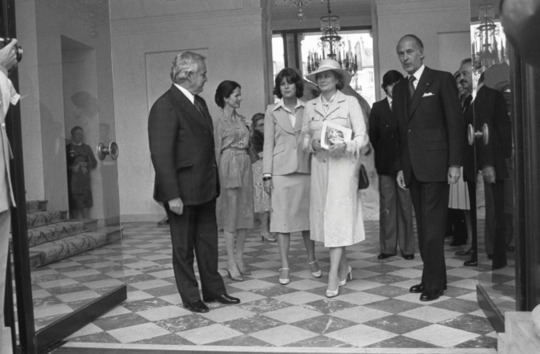
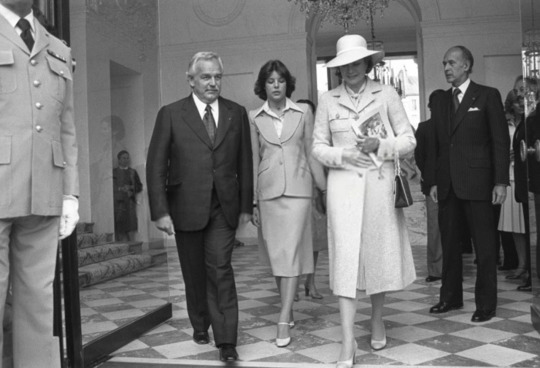
Prince Rainier of Monaco and Princesses Caroline and Grace received by the President of the Republic Valéry Giscard d'Estaing at the Elysée Palace, in Paris, on June 3, 1976, France.
2 notes
·
View notes
Text
Quand j'étais en Terminale, mon prof d'histoire était fréquemment absent. Je ne sais même plus son nom. Je me souviens surtout que nous n'avons pas eu d'histoire géo pendant un bon moment et quand nous avons enfin eu un remplaçant, il a été effaré de voir le retard accumulé dans le programme, l'année du bac. On n'a jamais fini le programme.
Bref me voilà en train de regarder un documentaire sur Valéry Giscard d'Estaing, parce que j'ai l'impression de ne pas assez bien connaître l'histoire de mon propre pays au 20ème siècle. Si vous avez MyCanal, c'est sur Toute l'histoire, et ça s'appelle "VGE, le théâtre du pouvoir".
youtube
#valéry giscard d'estaing#vge#françois mitterrand#politique française#french politics#french history#histoire de france#politics#Youtube
5 notes
·
View notes
Text

Valéry Thermidor de Tramery, my Half-Orc tiefling bureaucrat
His kink is excel spreadsheet and he's also a paladin sorcerer
#pathfinder#dnd#dungeons and dragons#dungeons and drawings#oc#original character#dnd oc#dnd character#half orc#tiefling#i named him after valéry giscard d'estaing and idk what to do with this fact#ttrpg art#ttrpg#dnd art#dungeon and dragon#my art
104 notes
·
View notes
Text

Avrei quest'idea per giovedì mattina.
Al posto di andare in ospedale a fare le analisi prima del grande controllo (che cadrà a metà maggio ma ehi, dobbiamo fare guarire tutte le vene che mi romperanno e ne romperanno parecchie in posti impensabili) farei un giretto a Parigi.
Ci vogliono solo una ventina di minuti di metro per arrivare a l'Esplanade Valéry Giscard d'Estaing e rimanere nel musée d'Orsay fino alle 21:15. Non posso dire che il musée d'Orsay sia il mio posto preferito al mondo in assoluto ma si avvicina tantissimo alla mia idea di casa.
Eh sì, i viaggi in treno sono un mondo a parte soprattutto se puoi allontanarti dai tuoi pensieri.
(I dont care where just FAR – away)
31 notes
·
View notes
Photo
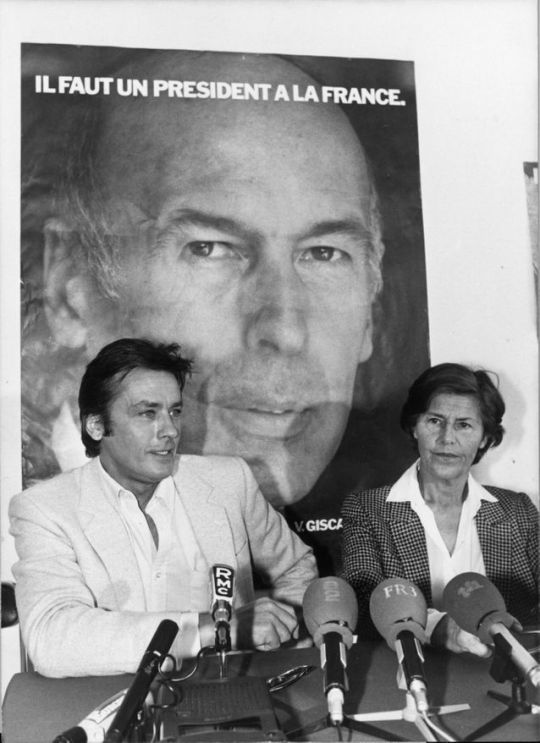
Alain Delon publicly announcing his support for Valéry Giscard d'Estaing in the French presidential elections. Paris, 1974.
#alain delon#70s aesthetic#70s fashion#1970s fashion#70s style#70s icons#1970s style#70s cinema#politics
4 notes
·
View notes
Text
Je suppose que l’Académie est enfin en train de s’effondrer. Treize des quarante sièges occupés, et ils n’accepteront même pas ce type? Il a peut-être un passé de scandales, mais je prendrais ce que je pourrais obtenir si j’étais à leur place 😂
0 notes
Text
En France, on a vérifié le roi cocufié par Noor de Jordanie.
On sait tous pour Hillary, bill et Monica. Donc ils nous haïssent toute la planète eux aussi.
Puis les autres pervers
La reine Sofia à cause de son époux Juan Carlos d'Espagne.
On sait tout.
Claude Pompidou, elle, a détruit toutes les personnes du chantage sexuel avec Alain Delon. Puis les autres, Donc toute la France.
Valéry Giscard d'Estaing a détruit ceux qui l'ont dit turc ou arabe plutôt qu'allemand.
Mitterrand a dû détruire pour que Mme Thatcher arrête de nous emmerder.
Chirac ça allait. Mais Balladur et Jospin continuent de détruire eux encore et toujours.
Sarkozy l'a fait, Hollande aussi.
Donc ils se moquent tous de macron et de Chirac.
Est ce que ce monde est sérieux...
0 notes
Text
NE TUONS PAS SAINT-MICHEL
Affaire PCF
Formation des élus
Rétributions au Parti
Mediapart tient à titrer
Et ici argument révolutionnaire
D'une gauche extra-parlementaire
Un électoralisme dénoncé
Votez pour nous
On aura des Z'élus cocarde tricolore
Et après quelles jambes ça nous fait
Et 2005
Non au traité Européen de Valéry Giscard d'Estaing
Candidature aux Présidentielles de 2007
Le PCF impose Marie Georges Buffet
L'unité d'une dynamique
Est cassée mais pas enterrée
A partir de ce non
Le combat nous reprenons
Première étape
Se séparer du souverainisme populisme
Des fachos et des cons
Deuxième étape
Sortir du néolibéralisme débattons
Rafistoler un système
Il n'en est pas question
Mardi 9 janvier 2024
0 notes
Video
youtube
Débat 5 mai 1981 :Valéry Giscard d'Estaing / François Mitterrand | Arch...
0 notes
Text
youtube
Watch the American Climate Leadership Awards 2024 now: https://youtu.be/bWiW4Rp8vF0?feature=shared
The American Climate Leadership Awards 2024 broadcast recording is now available on ecoAmerica's YouTube channel for viewers to be inspired by active climate leaders. Watch to find out which finalist received the $50,000 grand prize! Hosted by Vanessa Hauc and featuring Bill McKibben and Katharine Hayhoe!
#ACLA24#ACLA24Leaders#youtube#youtube video#climate leaders#climate solutions#climate action#climate and environment#climate#climate change#climate and health#climate blog#climate justice#climate news#weather and climate#environmental news#environment#environmental awareness#environment and health#environmental#environmental issues#environmental justice#environment protection#environmental health#Youtube
6K notes
·
View notes
Text

Before the match, the La Marseillaise, with in the grandstand President Valéry Giscard d'Estaing and Princess Grace in 1974.
4 notes
·
View notes
Text
Quinzaine 55: show these films that we cannot see! 3/4
“1973, we banned. 1974, we liberalize. Before repressing in 1975
then punishing in 1976” (Between two censures, 1989, Tony Crawley
and François Jouffa) On April 28, 1974, Valéry Giscard d'Estaing, newly elected President of the Republic, announced the abolition of censorship in France and advocated freedom of expression and creation. This decision will revolutionize the entire cinematographic landscape. In the capital, in the suburbs and in the provinces, cinemas shamelessly display erotic works on their facades and in
their halls. In one year, more than 128 voluptuous films were released in theaters: Les Jouisseuses, Emmanuelle, and La Papesse (to name but a few) set the crowds ablaze, rushing to see the taboo in scope. This slight curiosity will push 6,497,687 Parisians and suburbanites to cloister themselves in the confined, overheated and electrified rooms of the operators of 74. The Secretary of State, Michel Guy, in a burst of lucidity, or in a moment of weakness, will even authorize exploitation of pornographic films!

This wind of freedom will quickly reach the Croisette which will present to its official selection the sulphurous One Thousand and One Nights by Pier Paolo Pasolini and the outrageous Nine Lives of Fritz the Cat by Robert Taylor. La Quinzaine, for its part, will look to Yugoslavia to find THE right director for this year full of buttocks: Dusan Makavejev, author and screenwriter of Sweet Movie.
Carole Laure (Miss Canada) files a complaint against Makavejev, Anna Prucnal (Anna Planeta) is exiled from Poland for seven years, the film is banned in Great Britain and, in France, it is banned for minors under 18 . All this for what ? For a film-manifesto, a strong work which despite itself has generated a bigger scandal than it envisaged. For an erotico-political poem where socialism and capitalism contemplate each other with a curious eye and seek to tame each other. Unlike Dusan Makavejev's other films, Sweet Movie offers us a more direct social confrontation, without indigestible
government soliloquies. He seeks here to establish a sensory screen-spectator relationship. Sensuality is the main guideline of the staging
and the script, all the cohesion of the film crew aims to advocate the joy of living, universal love and self-knowledge through sex. Makavejev drops the masks of self-censorship, the spectator is exposed, his shell splits and melts in the face of Sweet Movie's warm humor and sexual sweat. We speak here of a "therapeutic effect" as a "light aphrodisiac", a non-verbal communication pushing the public to observe, feel, touch, taste and discover themselves through the work. Let us underline the fact that Makavajev, feeling guilty for this overflow of happiness in the face of the misery of the world, inserted into the film documentary sequences on the excavation of Polish corpses by Nazi officers.
Sad cruel world.
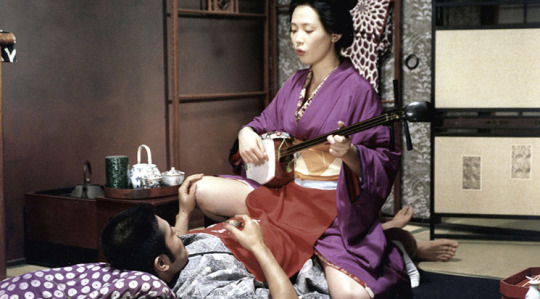
We will end the year, on October 17, 1974, with the abolition of the support fund for porn films… Are Monsieur Giscard and Monsieur Guy going back on their convictions? In 1976, the good resolutions of our two friends were shelved. Pornography? Eroticism you say? The past. Law X imposes itself insidiously, feigning the absence of censorship and displaying a simple restriction. The VAT on so-called porn films goes from 17.6% to 33.33%, 161 films are classified X
and prohibited from exploitation… The few works still in circulation are relegated to specialized cinemas penalized fiscally and financially. If that isn't censorship…
But the Fortnight still and always resists restriction, isolation, and blame, and it shows it more than ever with The Empire of the Senses by Nagisa Oshima. All of France is shaken, the phenomenon is unprecedented. Moreover, L'Empire des sens is not drowned in the selection, far from it, it is the opening film of this new program, the work brought to light, the work under the spotlights of the public, of critics, journalists, and the organization.
We will not expand more than necessary on this film which has already caused a lot of ink to flow (and many other more natural liqueurs). Just remember that this is a snub to Japanese taboos. Nagisa Oshima procured virgin French film, impregnated it in his native land, and sent him back to France for birth. L'Empire des sens is banned in Japan, Germany, Sweden, the United States, Belgium… But the Fortnight takes up the challenge of presenting this work, and tries to open the public's gaze not to an erotic film or pornographic, but on a visual poem worthy of Japanese prints. Everything here is implacably meticulous, the staging is refined, the dialogues finely orchestrated, and the dazzling colors reinforce the lyricism of what was originally just a news item.
L’Empire des sens establishes one and the same discourse: that of a
continuous love scene, the frame changes but the act remains. Even if the sex is not simulated, even if the final scene is incredibly violent, the film remains immaculate thanks to its visual perfection, and thanks to this speech being neither more nor less than an approval of the life unto death, the ultimate and unconditional love.
The works seen above are political, social, rebellious. She uses the
representation of sex to convey more or less abstract messages, but they neglect the love encountered in the sexual relationship. Nagisa Oshima, him, the sublime.
But if you miss politics, remember that in 1988, interviewed by Bernard Pivot, Jacques Chirac confessed: “I saw L’Empire des sens in the hall of a private cinema which belongs to the Ministry of Information. I felt it was a very beautiful film…”
Thanks to the Ministry of Information and thanks to Jacques!
- Clara Sebastiao
0 notes
Text
Féminisme en France : guide complet

Le féminisme en France a une longue histoire, et c'est aujourd'hui l'un des mouvements féministes les plus actifs d'Europe. C'est aussi l'un des plus débattus, car beaucoup de gens le considèrent encore comme une menace pour la famille et les valeurs traditionnelles. Cet article vous donnera un aperçu de ce qu'est le féminisme français, comment vous pouvez y participer et comment vous pouvez aider la cause de votre côté.
Qu'est-ce que le féminisme en France ?
Le féminisme français a une longue histoire, et c'est aujourd'hui l'un des mouvements féministes les plus actifs d'Europe. C'est aussi l'un des plus débattus, car beaucoup de gens le considèrent encore comme une menace pour la famille et les valeurs traditionnelles. Cet article vous donnera un aperçu de ce qu'est le féminisme français, de la manière dont vous pouvez vous impliquer et de la façon dont vous pouvez aider la cause de votre côté.
Pourquoi existe-t-il un mouvement féministe en France ?
La France est l'un des rares pays d'Europe occidentale où le féminisme n'a jamais été consid��ré comme une menace pour la société. Cela est dû en partie à la culture française, qui est considérée comme l'une des plus tolérantes au monde sur le plan culturel. C'est aussi une conséquence de l'histoire du pays, qui a vu plusieurs femmes jouer un rôle important dans l'évolution de la société et de la politique.
La première femme à occuper un poste politique a été Jeanne Moreau en 1933, qui a été la première femme maire d'une ville française. En 1944, Simone de Beauvoir a réussi à faire libérer un certain nombre de prisonnières politiques et, en 1985, la constitution a été modifiée pour permettre aux hommes et aux femmes de se présenter à la présidence.
Le combat des féministes françaises
Les féministes françaises ont toujours joué un rôle de premier plan dans les mouvements pour l'égalité dans le monde, et c'est également le cas dans leur pays d'origine.
La lutte pour les droits des femmes en France a commencé à la fin du 19e siècle, et il a fallu beaucoup de temps pour que les femmes soient autorisées à voter aux élections. La première femme à être élue à l'Assemblée nationale fut Marguerite Steinheil-Affouard en 1945.
Il a fallu attendre encore 50 ans pour que la loi soit théoriquement égale pour les hommes et les femmes, mais dans la réalité, c'est une toute autre histoire. Le mouvement féministe a connu de nombreux hauts et bas au fil des ans, et dans les années 1960 et 1970, il était à son apogée.
Cette période a vu un grand nombre de manifestations et d'actions de protestation, qui se sont arrêtées sous la présidence de Valéry Giscard d'Estaing.
Les principaux groupes et organisations féministes
Fédération des femmes françaises - La Fédération des femmes est la plus grande organisation féministe de France, et elle a des branches dans tout le pays. L'association a été créée en 1922 et n'a cessé depuis de lutter pour les droits des femmes. L'association est particulièrement impliquée dans des questions telles que les droits sexuels et reproductifs, la violence sexiste et la santé des femmes. Elle organise également des activités pour les femmes et contribue à l'éducation autour des questions féminines.
Égalité-égalité - Il s'agit d'un mouvement populaire qui vise à promouvoir l'égalité des sexes en France et à encourager davantage de personnes à s'engager dans le mouvement féministe. Le mouvement a été lancé par un groupe d'élèves du secondaire et vise à encourager les jeunes à s'engager dans le mouvement féministe.
Où en savoir plus sur le féminisme en France et s'impliquer ?
Il existe de nombreux endroits où vous pouvez en apprendre davantage sur le féminisme français ou vous engager dans le mouvement féministe. La plus grande association féministe du pays est la Fédération des femmes, qui gère également un site web qui informe les gens des événements, ateliers et autres activités qui se déroulent au sein de l'association et dans tout le pays. Un autre endroit où vous pouvez en apprendre davantage sur le féminisme français est dans les universités et les écoles supérieures du pays.
La France compte de nombreuses universités qui proposent des programmes diplômants en études de genre et en études féminines, qui sont souvent des matières obligatoires. Les universités et les écoles supérieures organisent régulièrement des conférences et des symposiums sur toutes sortes de questions liées au genre et au féminisme.
Nous recommandons ces livres sur le féminisme en France
Voici des livres et des articles qui vous aideront à en savoir plus sur le féminisme français et à vous impliquer. Voici nos recommandations pour les meilleurs livres sur le féminisme français et les questions féminines en général.
Les femmes et l'Égalité - Ce livre de Caroline Fourest explore l'histoire des droits des femmes en France et la façon dont ils ont évolué au fil des ans. Il examine également la manière dont ces droits ont influencé la culture et la politique françaises. Ce livre est écrit dans une perspective féministe et est fortement recommandé.
Les féministes et la France - Ce livre de Claire Honnêtre explore l'histoire du féminisme français, ses différents mouvements et la manière dont il s'est développé au fil des ans. Il examine également les différents défis auxquels les féministes françaises sont confrontées aujourd'hui. Ce livre est fortement recommandé.
Par-dessus tout - Ce livre de Catherine Walsh est un recueil d'essais sur des questions contemporaines liées au féminisme et au genre. Les essais sont écrits par d'éminents écrivains et journalistes français et sont vivement recommandés.
Read the full article
0 notes